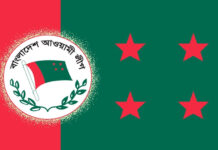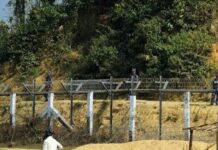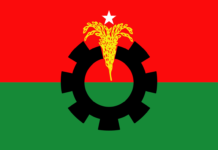
In an Interview with Dhaka Tribune’s Saqib Sarker, Peter Fahrenholtz, German ambassador to Bangladesh, talks about bilateral relations, democracy, climate change and more. This is the final part of a two-part interview
Bangladesh is one of the most vulnerable countries to the impact of climate change, and Germany has invested in many projects like the recent water plantation project. What kind of cooperation and collaboration you would want with Bangladesh to work specifically on climate change issues?
Bangladesh is one of most vulnerable countries to the consequences of climate change because of being so close to the sea and prone to weather events like cyclones. One of the main focuses of our development cooperation is exactly in this area, helping the people of Bangladesh to cope with the consequences of climate change. We have already had the bilateral government negotiations for the next two years of our cooperation and development, and we talked exactly about this with the government, ie what we can do to assist in this area or adjusting to climate change. We are spending tens of millions of dollars in this area in projects to help.
One of the elements of climate change is that the effects spill over national boundaries. One of those consequences is climate refugees. More migrants also mean pressure on other nations. Do you think Germany and other countries see that as urgent to them as well?
Of course we see the high urgency. Germany has been very involved in pushing ahead the international conventions to combat climate change. We have the COP24 Conference coming up in Poland next year, and I think Germany and the German population plays a huge role. German people are very aware of the ecological impact of climate change, and this means we will do everything, working together with Bangladesh, to promote solutions to combat climate change.
Most people in the world want to stay in their own country. Most people don’t want to migrate. If only the conditions in the home countries become intolerable, then people consider migrating to other places in the world. This is what we are looking at, especially as a lot of migrants are coming from Africa to Europe, so we are collaborating with African countries in helping them to improve the conditions in their own countries so people don’t see any need for migration any more.
One of the first public comments you made in Bangladesh was during your meeting with the foreign minister, in which you welcomed the political dialogue between the ruling party and the opposition alliance that was initiated then. Will Germany exert diplomatic influence or pressure for a fair and transparent election?
You know we are not here to exert pressure or influence the people or the government of Bangladesh. These elections are the responsibility of the people in Bangladesh; it is the people who must find a solution. The point I want to make is, if you look at the future of Bangladesh, it is up to the people of Bangladesh to find the way forward. It is not up to us, the foreign observers, to tell Bangladesh where this country should go. It is up to the people. This is what democracy is about.
But if you ask my advice, I will be happy to give my advice as a neutral diplomat and an observer. And in this respect, of course we believe that the dialogue between the different political parties is an important step forward. If you sit down, talk with each other, understand each other’s viewpoints and talk directly with each other, it can only be helpful. As a result, usually you would have a consensus when you move forward, and I can say Bangladesh is graduating now from a low-income country to middle-income country. We see a lot of economic progress, and I am sure, as history teaches us, that the political system has to move in parallel with economic progress. The political system will be reforming itself in order to enable future economic growth, and the political system will need to take the necessary steps to become a modern democracy, where stability is guaranteed and all the people can live in freedom and prosperity.
From that respect this election is going to be very important because the people of Bangladesh are deciding now which way they want to go. If I understand correctly, the prime minister has assured in her speech that the election will be free and fair, and that we will have a parliament that will represent the people and can find solutions for all the grievances that are raised by the people.
There has been a rise of what’s called the ‘extreme right’ throughout Europe and in many places in the world, as exemplified by the recent election in Brazil. I am interested to know your thoughts on this.
Well, Germany is a democracy and in Europe we have democratic countries. They elect the parliament and politicians, and as long as the political party stands on constitutional grounds, they have every right in the world to do and say what they want. And obviously if you had a society where there is only one mainstream opinion, it would mean that it is somehow not a society that is diverse and rich in its opinions. As such, we have a rise of conservative parties in Europe and Brazil, maybe other countries of the world, which is completely legitimate.
May be I or you or we do not agree with their opinions, but that’s politics. This is what democracy is all about, competition of political opinions with each other, which is then presented to the voter and he/she will elect who he/she thinks is right. So I think it is completely legitimate. We refuse violence and we demand that every political group or party remains on constitutional grounds and acts within the law.
Tell us about your impression so far from being in Bangladesh.
I am excited to be in Bangladesh, which is a very dynamic country. I see a lot of movement here, positive movement towards the future. People are very friendly, very dynamic, and they work very hard – and this gives me great hope that this country, 20 years from now, can be a prosperous and free country with a democratic system giving the people everything they need.
Source: Dhaka Tribune.









